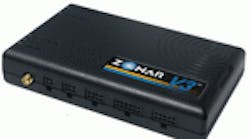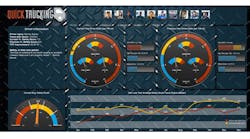I’m on vacation this week, but I can’t shake logistics. Everything I read reminds me of what I write about. It happened this morning as I checked my e-mail and this little news item caught my attention:
“N.J. Man In A Jam, After Illegal GPS Device Interferes With Newark Liberty Operations”
This incident involved an engineer whose job involved driving a company truck. His company equipped the vehicle with a GPS device to track vehicle movements. He didn’t like that. So his dislike of “Big Brother” inspired him to invest in a GPS jamming device to thwart his bosses. That’ll fix ‘em.
Well, not really. His travels on the job take him near Newark’s Liberty Airport, and his GPS jammer ended up interfering with a new GPS-based guidance system being tested at the airport.
His desire to escape the attention of his overlords brought in the BIG Big Brothers—the Feds. Federal agents were able to track the offending jamming signal to his truck and the result was a $32,000 fine. His jammer got him into a jam with his bosses too—who promptly fired him.
This sad story is a good lesson for privacy-loving employees everywhere, no matter what they drive—even forklifts. As we’ve reported in several stories, telematics-based forklift fleet management can help companies save money otherwise lost through inefficient operations and practices. But the vendors of these tracking systems have had their share of run-ins with guys like the Newark Jammer, so they recommend that their customers be proactive when applying these systems.
One vendor (Telogis, providers of a cloud-based GPS fleet tracking systems) advises that employees need to buy into the system too, acknowledging that they may resist it initially.
“Drivers may have concerns about a GPS fleet management system invading their privacy,” they say in a feature on their website. “They may feel it sends a signal that they can't be trusted or that you are spying on them. They may not understand why you feel the need to equip fleet vehicles with GPS tracking devices, and may even think you're conducting a ‘witch hunt.’ Involving your drivers early in the deployment process, and clearly explaining your goals for the technology, can ease the transition.”
They offer 10 tips for implementing a GPS fleet management system:
1. Emphasize the benefits for staff [no more manual log book entries, time-stamped proof-of-delivery documentation, less paperwork, more potential to offer bonuses based on metrics, etc.]
2. Share the savings [some of the savings made from implementing the fleet management software can be distributed to staff]
3. Be honest and open [Don't install GPS tracking without informing staff about it]
4. Clearly explain how it works [not as a ‘boss in a box,’ but as a collector of operational data to improve productivity]
5. Make sure they know it's not personal [it’s to optimize the entire fleet, not individual drivers]
6. Talk about fleet safety [Most drivers will understand that need]
7. Be open to employee ideas [Being open to modifying the system based on their feedback will help ensure driver acceptance]
8. Don't hide the benefits to the company [be clear about how the company stands to benefit]
9. Keep the mood positive [Detail how those company benefits translate to employee benefits]
10. Don't expect everyone to be happy [You may have to weed people out, like the Newark Jammer’s employer did.The drivers you want to keep will be glad that kind of character’s no longer making them carry an unfair share of the workload].
Maybe if all else fails, a sign on the back of the vehicles in your fleet will send a message to employees and to anyone outside your company: “How’s my driving? Don’t call—my manager already knows.”





